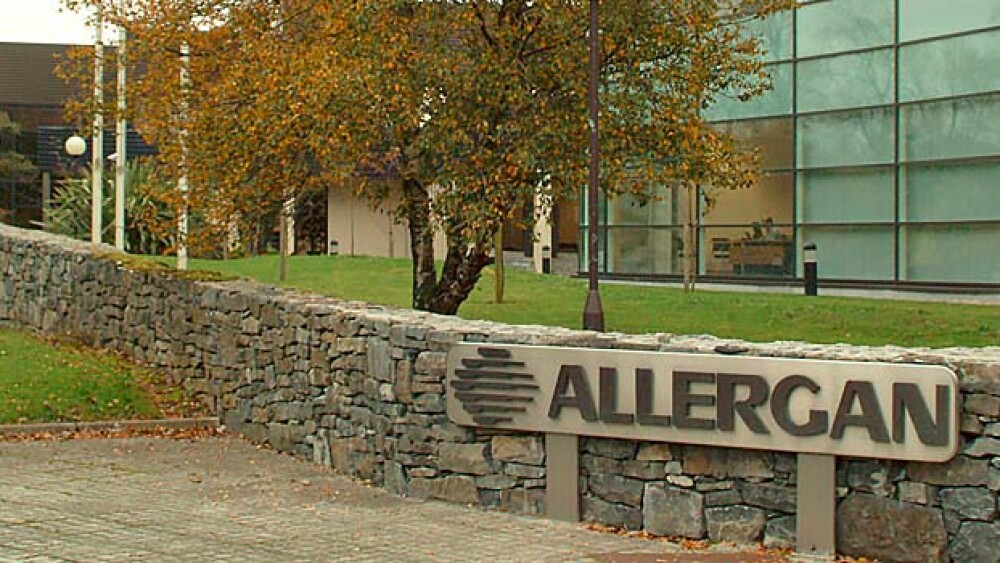Shares of Allergan have been in decline for more than a year and that has created an opening for some investors to begin rattling sabers about change at the company.
Shares of Allergan have been in decline for more than a year and that has created an opening for some investors to begin rattling sabers about change at the company known for Botox.
Allergan’s stock has fallen about 33 percent since this time last year when it was trading at $243.05 per share. This morning shares of Allergan are trading at $160.53 as of 9:22 a.m. On Thursday Business Insider reported that some of the company’s biggest stakeholders have banned together to talk with activist investors “to gauge their interest in pushing for change.” Who the shareholders are was not disclosed, but Business Insider said it spoke “half a dozen funds with top 50 positions in Allergan.” The upset shareholders are keen on Allergan selling off some products and business interests that are not considered to be key drivers for the Ireland-based company. Some of those businesses not seen as necessary by the consortium of investors include the company’s women’s health business, which includes birth control pill Lo Loestrin Fe and the menopause treatment Femring.
The concerned investors would prefer Allergan focus on key drivers, including its Botox franchise and other aesthetics products such as Kybella, a therapy for the improvement in the appearance of moderate to severe convexity or fullness associated with submental fat in adults – or more simply, double chins. Another key driver for the company is its dry eye treatment Restasis. Combined the company’s aesthetics business and Restasis generate about 40 percent of Allergan’s annual income, according to Business Insider.
Botox has certainly been a strong driver for the company, but it could be threatened by a generic. In March Mylan and Revance Therapeutics announced a deal to develop and market a biosimilar to Botox. Mylan is also attempting to develop a generic for Restasis. Last fall Mylan was successful in having some of the patents on Restasis invalidated. In a statement in October 2017, Mylan said the invalidation of the patents will help clear the way for a generic challenge to Restasis. If those options are successfully developed, it could significantly impact Allergan’s bottom line.
Last month though Allergan Chief Executive Officer Brent Saunders dismissed the biosimilar challenge to Botox. During a talk at Barclays Healthcare Conference Saunders said it would be very difficult to create a biosimilar of Botox, The Street reported. He said it would be difficult to replicate the development due to “complex proprietary manufacturing process that’s been developed over 30 years.”
Allergan could seek to generate new revenues through some sort of M&A activity. The company had been reported to be in talks to possibly acquire Shire Plc, but Takeda Pharmaceuticals appears to be in the driver’s seat for that deal.
But amidst all the reported activist investor drama, Allergan has been successfully expanding its programs in migraine headache therapies and neurological disorders. Earlier this month Allergan and its development partner Gedeon Richter Ltd. announced positive topline Phase III results for (Vraylar) cariprazine, its treatment for major depressive episodes associated with bipolar I disorder. The companies are looking for add-on approval. Vraylar was initially approved by the U.S. Food and Drug Administration approved for the acute treatment of schizophrenia and acute treatment of manic or mixed episodes of bipolar I disorder in adults. Last year the drug was approved for a new indication for the maintenance treatment of adults with schizophrenia.
The company is also driving its migraine treatment offerings, which includes Botox injections. This morning Allergan announced the second of two pivotal Phase III trials evaluating ubrogepant for single migraine attacks in adults. In February Allergan reported the first Phase III results that showed a statistically significant greater percentage of ubrogepant patients achieving pain freedom at two hours after the initial dose compared to placebo. The company is eying the filing of a New Drug Application in 2019.





